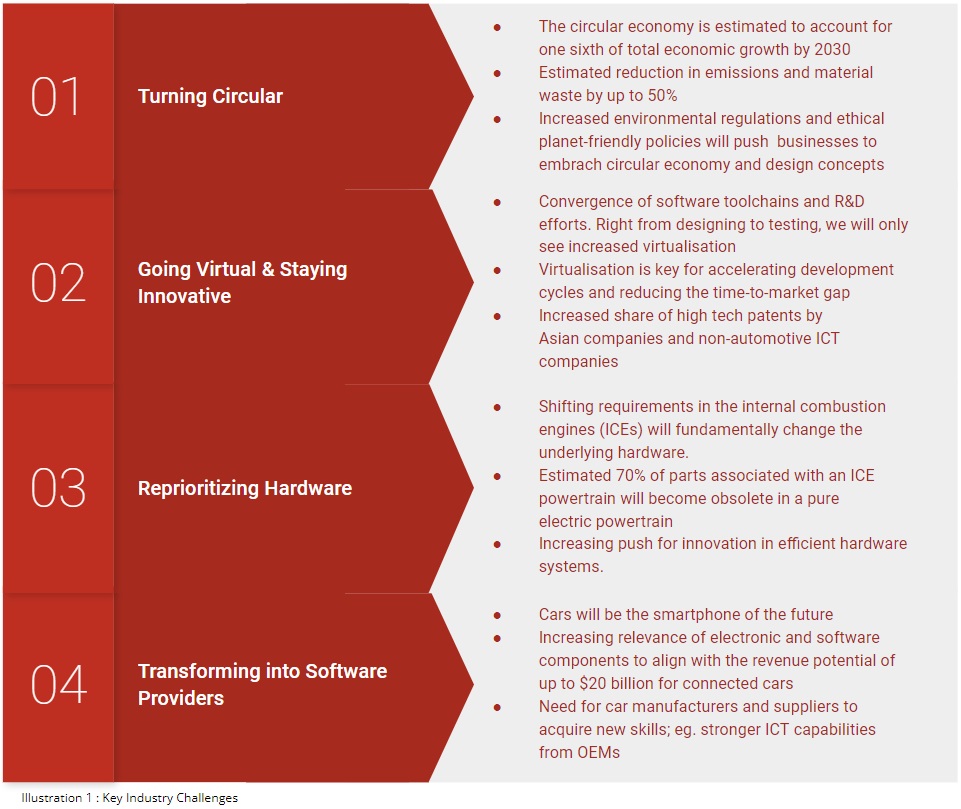Intelligent Automotive Series
Written by Sushaiv Wadekar 03 Jun, 2022
The Next Decade: Connected, Intuitive and Sustainable
Driven by ever-evolving technological advancements and customer preferences, the entire automotive industry stands at a crossroads. Various challenges related to the overall ecosystem, product development, and manufacturing are disrupting the existing business models, highlighting the urgent need to find effective solutions. Automotive supply chains are already being massively transformed as innovators envision products and services for the customer of 2030.
The pursuit of advancing innovations in electric vehicles and autonomous cars will push the industry to rethink hardware requirements, prioritize budgetary allocations, plan for obsolescence and innovate with rapid time-to-market. As driverless cars become a reality, precise map generation using machine learning (ML) and artificial intelligence (AI) will become a crucial requirement. With the battery replacing the internal combustion engine, a major chunk of R&D effort will be directed towards electrification and allied areas.
In their quest for sustainability, more countries are poised to follow the EU’s Circular Economy Action Plan (CEAP) and embrace circular economy policies and practices. Businesses will need to revamp their existing value chains in accordance with stringent environmental regulations. Automakers will have to innovate with a Design for Circularity approach that is capable of supporting complete cradle-to-grave product management.
Megatrends like Connected, Autonomous, Shared, and Electric (CASE) will aggravate a major challenge of the automotive industry: a talent and skills mismatch. Especially in the automotive software domain, external consultations with architects and experts are a frequent necessity due to the massive technology-talent gap. While this has been identified as a long-standing challenge by automakers, the process of upskilling, reskilling, and drawing on suitable talent from adjunct industries is an ongoing one. Skills outsourcing, assimilating top-tier talent and co-development strategies are, therefore, extremely hot topics in today’s market.
Data is indeed the New Oil
Autonomous vehicles of the future will create terabytes of data per day that will need to be stored, processed, and analyzed. The roll-out of 5G and its enablement of faster, less latent Vehicle to Everything (V2X) communications will ensure that insight from other vehicles, pedestrians, and infrastructure modules are passed to and from the car. Automakers with capabilities to crunch and make sense of all this data will be well-equipped to channelize R&D efforts, manage warranty costs, and build effective customer relationships. These trends also underline the need for privacy compliance, robust cyber-security practices, and concrete data breach policies.
Reinventing the Automotive Future
The automotive industry is in its most disruptive phase yet. Innovators will have to revamp existing models with the objective of future-proofing production, making development processes agile and cost-efficient, digitalizing upstream and downstream structures, and promoting a real difference in terms of end-customer experiences.

The differentiators of the automotive industry’s tomorrow will differ significantly from the USPs we see today and the catalysts we witnessed yesterday. While hardware-related aspects like chassis safety, ASICs, or mechanical setups will remain important, they are on the verge of being commoditized. The time and resources spent on these tasks will need to be reconsidered as they will lose their primacy in building a unique brand.
As part of this series, every week we will explore one area of transformation in detail—defining key issues, identifying emerging opportunities, highlighting industry’s strategic responses, offering insights and guidance into how stakeholders can actively keep pace with the market demands.
Part 1 will explore new-age concepts like Circular Economy, Industry 4.0 and their impact on the automotive industry. If you would like to be notified about Part 1, Please follow us on LinkedIn for our news updates & Click here to know more.
###
References: Figures and illustrations are developed with and by Frost & Sullivan, e.g. the MG08 - Global Automotive Outlook 2021 report.
.png?width=774&height=812&name=Master%20final%201%20(1).png)